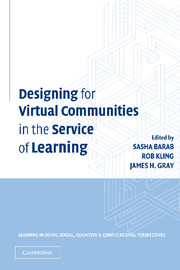Book contents
- Frontmatter
- Contents
- List of Contributors
- Series Foreword
- Foreword
- Preface and Acknowledgments
- In Memoriam
- PART I COMING TO TERMS WITH COMMUNITY
- PART II DESIGNING FOR WEB-SUPPORTED COMMUNITY
- PART III FOSTERING COMMUNITY/MEMBER PARTICIPATION
- PART IV RESEARCHING ONLINE COMMUNITY
- Index
- Titles in the series
Foreword
Published online by Cambridge University Press: 05 June 2012
- Frontmatter
- Contents
- List of Contributors
- Series Foreword
- Foreword
- Preface and Acknowledgments
- In Memoriam
- PART I COMING TO TERMS WITH COMMUNITY
- PART II DESIGNING FOR WEB-SUPPORTED COMMUNITY
- PART III FOSTERING COMMUNITY/MEMBER PARTICIPATION
- PART IV RESEARCHING ONLINE COMMUNITY
- Index
- Titles in the series
Summary
These are early days in the exploration of how the concept of community –challenging enough in its own right for inquiries in social science, politics, and education – is to be understood in the emerging hybrid worlds in which people live. These worlds are not simply governed through face-to-face communication. Conversations and relationships are, for a growing number of people, mediated through new tools enabled by computing and telecommunications. These are exciting times, akin to the first decades of the written word and the discourse that might have ensued around what it meant to have the new “virtual talk” that texts created. An examination of Socrates' dialogues in Plato's Phaedrus may provide some insight into what such discourse might have been like as Socrates questions the wisdom of writing and books. In these dialogues, Socrates outlines the myth of how the ancient god Theuth gave writing to Thamus, the king of Egypt, and although Theuth advocates that his discovery of writing “provides a recipe for memory and wisdom” that ought to be imparted to other Egyptians, Thamus challenges the gift:
If men learn this, it will implant forgetfulness in their souls; they will cease to exercise memory because they rely on that which is written, calling things to remembrance no longer from within themselves, but by means of external marks. What you have discovered is a recipe not for memory, but for reminder. […]
- Type
- Chapter
- Information
- Designing for Virtual Communities in the Service of Learning , pp. xiii - xviPublisher: Cambridge University PressPrint publication year: 2004



